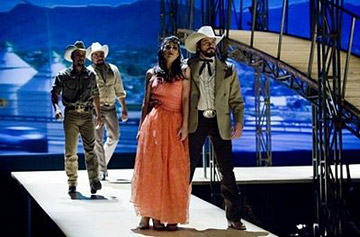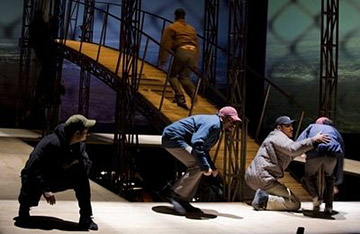
|  |  |  Entertainment Entertainment  
Drug Violence Hits the Stage in Mexico City Opera
 Jennifer Gonzalez - Agence France-Presse Jennifer Gonzalez - Agence France-Presse
go to original
March 22, 2010


| 
| 
| | Actors are pictured during the play "Camila la Texana" in Mexico City. A multimedia opera about the "narcocorrido" music of "Camilia la Texana", the mistress of a drug dealer shot dead with seven bullets by her lover, has opened in the capital of Mexico, as the nation is plagued by a bloody war between the drug lords. (AFP/Luis Acosta) |  |
Mexico City – An opera based on a modern-day myth of a drug trafficker's murderous lover has provoked fresh debate around music that glorifies Mexico's murky world of drug trafficking.

The opera, "Camelia The Texan", opened at a Mexico City cultural festival this month as suspected drug violence spiralled in parts of the country, with more than 15,000 killed since the end of 2006.

Recent deaths include multiple killings near the beach resort of Acapulco and three US consulate-linked slayings in the most violent city of Ciudad Juarez, on border with the United States.

A giant screen projects images of the notorious border city at the start of "Camelia The Texan," which is based on a Mexican drug ballad, or "narcocorrido," made famous by the Los Tigres del Norte band in the 1970s.

It includes a cast of dozens dressed in Mexico cowboy outfits, including wide-brimmed hats and colorful dresses, and took 10 years to produce.

"If the stories for operas at the end of the 19th and beginning of the 20th century were about violence, crime and scandal, why not make one based on a tragedy in Mexico which appears in the sensational press?" composer Gabriela Ortiz told AFP.

The words "drug trafficker" are sung numerous times by the sopranos and tenors, along with Mexican slang and swear words and accompanied by a traditional orchestra, accordions and electric guitars.

The composer and her brother, visual artist Ruben Ortiz, trawled through the archives of an out-of-print sensationalist magazine called "Alarm!" in their search for a modern-day Mexican drama that would provide a good opera plot.

They found "Camelia The Texan," a popular Mexican myth that has also served as inspiration for the book "La Reina del Sur," or "Queen of the South," by Spanish writer Arturo Perez Reverte.

The original aim, Ortiz said, was "to show how the media builds up and keeps myths alive."

The opera, which is divided into six scenes, includes various versions of the same myth, including the rape of the protagonist, Camelia, and the claim that she killed 27 people.

In one scene, an opera singer who plays the role of the leader of Los Tigres del Norte explains that narcocorridos are relevant because they cover things that "have happened and still happen." Camelia was a brave woman, he says.

The work gives a nod from musical academia to the much-criticized narcocorridos at a time when some lawmakers are seeking to punish their composers, who they consider to be criminal accomplices.

"Any musical, cultural or cinematographic reference to drug trafficking must include a warning that its subject matter is rubbish," conservative congressman Oscar Martin Ace, who has proposed a law to regulate narcocorridos, told AFP.

Some radio stations in the north of the country, the scene of much of Mexico's drug violence, have even banned the broadcast of narcocorridos.

"I emphatically reject any attempt at censorship. Ballads and drug ballads depict moments in history and censoring them does not solve the problems of violence," said the drug opera's composer, who is also a respected soprano.

In the last scene, singer Nieves Navarro, wearing cowboy boots and a cowboy hat, sings the whole text of the "Contraband and Passion" drug ballad on which the opera is based.

"Seven bullets rang out. Camelia killed Emilio. The police only found a fired gun, money, and nothing was known of Camelia ever again," he sings, before loud applause erupts in the Mexico City theater. |

 |
|  |



